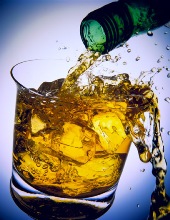 Bacteria fed on whiskey 'leftovers' can now be used to fuel vehicles.
Bacteria fed on whiskey 'leftovers' can now be used to fuel vehicles.
A Scottish company has signed a 'first of its kind deal' in the world to turn by-products from its distillery into fuel for cars.
The Tullibardine distillery in Perthshire has linked up with a spin-out company from Napier University in Edinburgh, as they plan to use bacteria to feed on the "leftovers" from the whiskey making process.
This will produce butanol which can be used to fuel vehicles, the 'BBC News' reported.
More than 90 per cent of the stuff that comes out of a whiskey distillery is not just whiskey, but leftovers like draff and pot ales -- both are produced in the early stages of the process.
They are high in sugar and are currently used for things
Napier University's Biofuel Research Centre has already shown that the bacteria can feed on whiskey by-products to produce butanol -- a direct replacement for vehicle fuel.
Now the spin-out company, Celtic Renewables, and independent malt whiskey producer Tullibardine have signed a memorandum of understanding.
They intend to apply the process to thousands of tonnes of the distillery's leftovers.
"Our partnership with Tullibardine is an important step in the development of a business which combines two iconic Scottish industries -- whiskey and renewables," Professor Martin Tangney, founder of Celtic Renewables, said.
"This project demonstrates that innovative use of existing technologies can utilise resources on our doorstep to benefit both the environment and the economy," said Tangney.









 © 2025
© 2025